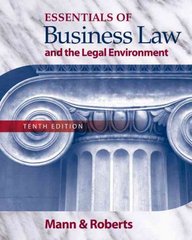Question
1.A tax of 20 cents per unit of imported cheese would be an example of a (an):* a. Compound tariff b. Effective tariff c. Ad
1.A tax of 20 cents per unit of imported cheese would be an example of a (an):*
a. Compound tariff
b. Effective tariff
c. Ad valorem tariff
d. Specific tariff
2.A tax of 15 percent per imported item would be an example of a (an):*
a. Ad valorem tariff
b. Specific tariff
c. Effective tariff
d. Compound tariff
3.Which type of tariff is expressly forbidden by the U.S. Constitution?*
a. Import tariff
b. Export tariff
c. Specific tariff
d. Ad valorem tariff
4. Which trade policy results in the government levying both a specific tariff and an ad-valorem tariff on imported goods:*
a. Compound tariff
b. Nominal tariff
c. Effective tariff
d. Revenue tariff
5.Ad valorem tariffs are collected as*
a. fixed amounts of money per unit traded
b. a percentage of the price of the product
c. a percentage of the quantity of imports
d. all of the above
6.Specific tariffs are collected as*
1 point
a. fixed amount of money per unit traded
b. a percentage of the price of the product
c. a percentage of the quantity of imports
d. all of the above
7.Most tariffs have*
a. only revenue effects
b. only protective effects
c. both protective and revenue effects
d. neither protective or revenue effects
8.The effective rate of protection*
a. distinguishes between tariffs that are effective and those that are ineffective
b. is the minimum level at which a tariff becomes effective in limiting imports
c. shows how effective a tariff is in raising revenue for the government
d. shows the increase in value added for domestic production that a particular tariff structure
makes possible, in percentage terms
9. A tariff that prohibits imports has only*
a. a revenue effect and redistribution effect
b. revenue effect and protection effect
c. consumption effect and protection effect
d. redistribution effect and consumption effect
10. If a nation fitting the criteria for the small nation model imposes a 10 percent tariff on imports ofautos*
a. the price of autos within the nation will rise by 10 percent
b. the price of autos within the nation will rise by less than 10 percent
c. the price of autos within the nation will rise by more than 10 percent
d. the price of autos will not rise because of internal competition
Submit
Step by Step Solution
There are 3 Steps involved in it
Step: 1

Get Instant Access to Expert-Tailored Solutions
See step-by-step solutions with expert insights and AI powered tools for academic success
Step: 2

Step: 3

Ace Your Homework with AI
Get the answers you need in no time with our AI-driven, step-by-step assistance
Get Started


